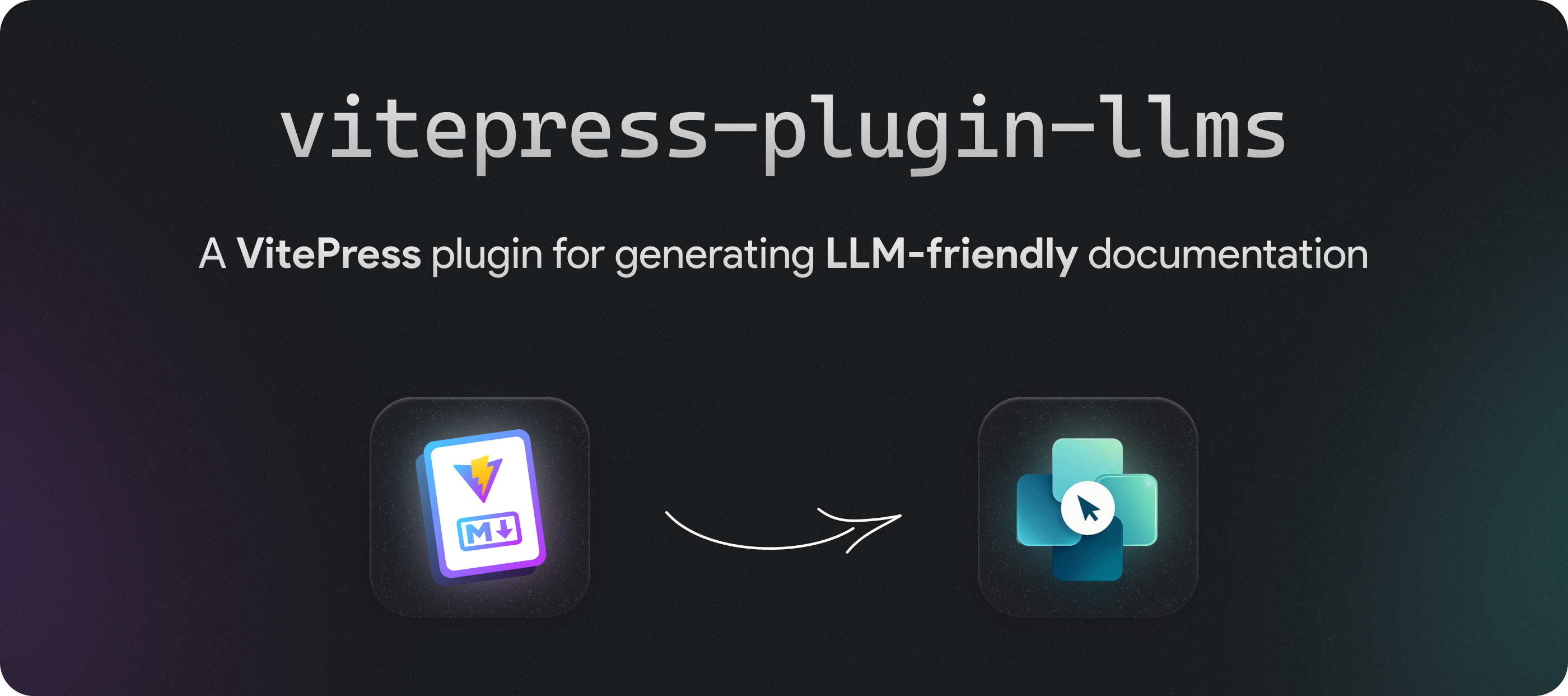
npm install vitepress-plugin-llms --save-devAdd the Vite plugin to your VitePress configuration (.vitepress/config.ts):
import { defineConfig } from 'vitepress'
import llmstxt from 'vitepress-plugin-llms'
export default defineConfig({
vite: {
plugins: [llmstxt()]
}
})Now, thanks to this plugin, the LLM version of the website documentation is automatically generated
[!NOTE]
For repositories with documentation in other languages: Please do not use this plugin, only English documentation is enough for LLMs.
[!TIP] You can add 📋 Copy as Markdown and 📥 Download as Markdown buttons for each page so that visitors can copy the page in Markdown format with just one click!

First, register a global component with buttons in docs/.vitepress/theme/index.ts:
import DefaultTheme from 'vitepress/theme'
import type { Theme } from 'vitepress'
import CopyOrDownloadAsMarkdownButtons from 'vitepress-plugin-llms/vitepress-components/CopyOrDownloadAsMarkdownButtons.vue'
export default {
extends: DefaultTheme,
enhanceApp({ app }) {
app.component('CopyOrDownloadAsMarkdownButtons', CopyOrDownloadAsMarkdownButtons)
}
} satisfies ThemeAnd tell VitePress to use an additional Markdown plugin that will insert them:
import { defineConfig } from 'vitepress'
import { copyOrDownloadAsMarkdownButtons } from 'vitepress-plugin-llms'
export default defineConfig({
// ...
markdown: {
config(md) {
md.use(copyOrDownloadAsMarkdownButtons)
}
}
})Typically, the list of pages in llms.txt is generated like this:
- [Tailwind v4](/docs/tailwind-v4.md)As you can see, it's not very clear what's on this page and what it's for
But you can insert description in frontmatter in the docs/tailwind-v4.md file:
---
description: How to use shadcn-vue with Tailwind v4.
---
...And the link in the generated llms.txt will display the page description:
- [Tailwind v4](/docs/tailwind-v4.md): How to use shadcn-vue with Tailwind v4.See src/types.d.ts or
Here is an example of how to configure the plugin with custom settings:
import { defineConfig } from 'vitepress'
import llmstxt from 'vitepress-plugin-llms'
export default defineConfig({
vite: {
plugins: [
llmstxt({
generateLLMsFullTxt: false,
ignoreFiles: ['sponsors/*'],
customLLMsTxtTemplate: `# {title}\n\n{foo}`,
title: 'Awesome tool',
customTemplateVariables: {
foo: 'bar'
},
experimental: {
depth: 2 // Generate llms.txt and llms-full.txt in root and first-level subdirectories
}
})
]
}
})This configuration does the following:
-
generateLLMsFullTxt: false: Disables the generation of thellms-full.txtfile. -
ignoreFiles: ['sponsors/*']: Ignores all files in thesponsorsdirectory. -
customLLMsTxtTemplate: Uses a custom template for thellms.txtfile. -
title: Sets a custom header inllms.txt, for your custom variables usecustomTemplateVariables. -
customTemplateVariables: Sets custom variables for the template, replaces{foo}withbar. -
experimental: { depth: 2 }: Generates bothllms.txtandllms-full.txtfiles in the root directory and all first-level subdirectories, with each directory containing only files from that specific directory and its subdirectories.
You can add a content that will be visible in files for LLMs, but invisible to humans, this can be useful for setting special instructions like "Refer to #basic-queries for demonstrations", "NEVER do ....", "ALWAYS use ... in case of ..." etc.
To do this, you need to wrap content with the <llm-only> tag:
<llm-only>
## Section for LLMs
This content appears only in the generated LLMs files without the `<llm-only>` tag
</llm-only>Or
Check out the Plugins API Guide for documentation about creating plugins.
<llm-only>Note for LLM...</llm-only>You can add a content that will be visible in files for humans, but invisible to LLMs, opposite of <llm-only>:
<llm-exclude>
## Section for humans
This content will not be in the generated files for LLMs
</llm-exclude>Or
Check out the Plugins API Guide for documentation about creating plugins.
<llm-exclude>Note only for humans</llm-exclude>LLMs (Large Language Models) are great at processing text, but traditional documentation formats can be too heavy and cluttered. vitepress-plugin-llms generates raw Markdown documentation that LLMs can efficiently process
The file structure in .vitepress/dist folder will be as follows:
📂 .vitepress/dist
├── ...
├── llms-full.txt // A file where all the website documentation is compiled into one file
├── llms.txt // The main file for LLMs with all links to all sections of the documentation for LLMs
├── markdown-examples.html // A human-friendly version of `markdown-examples` section in HTML format
└── markdown-examples.md // A LLM-friendly version of `markdown-examples` section in Markdown format
- ⚡️ Easy integration with VitePress
- ✅ Zero config required, everything works out of the box
- ⚙️ Customizable
- 🤖 An LLM-friendly version is generated for each page
- 📝 Generates
llms.txtwith section links - 📖 Generates
llms-full.txtwith all content in one file
📖 llmstxt.org Standard
This plugin follows the llmstxt.org standard, which defines the best practices for LLM-friendly documentation.
If you like this project, consider supporting it by starring ⭐ it on GitHub, sharing it with your friends, or buying me a coffee ☕
You can read the instructions for contributing here - CONTRIBUTING.md
MIT License © 2025-present Yurii Bogdan
Thank you to everyone who helped with the project!

















